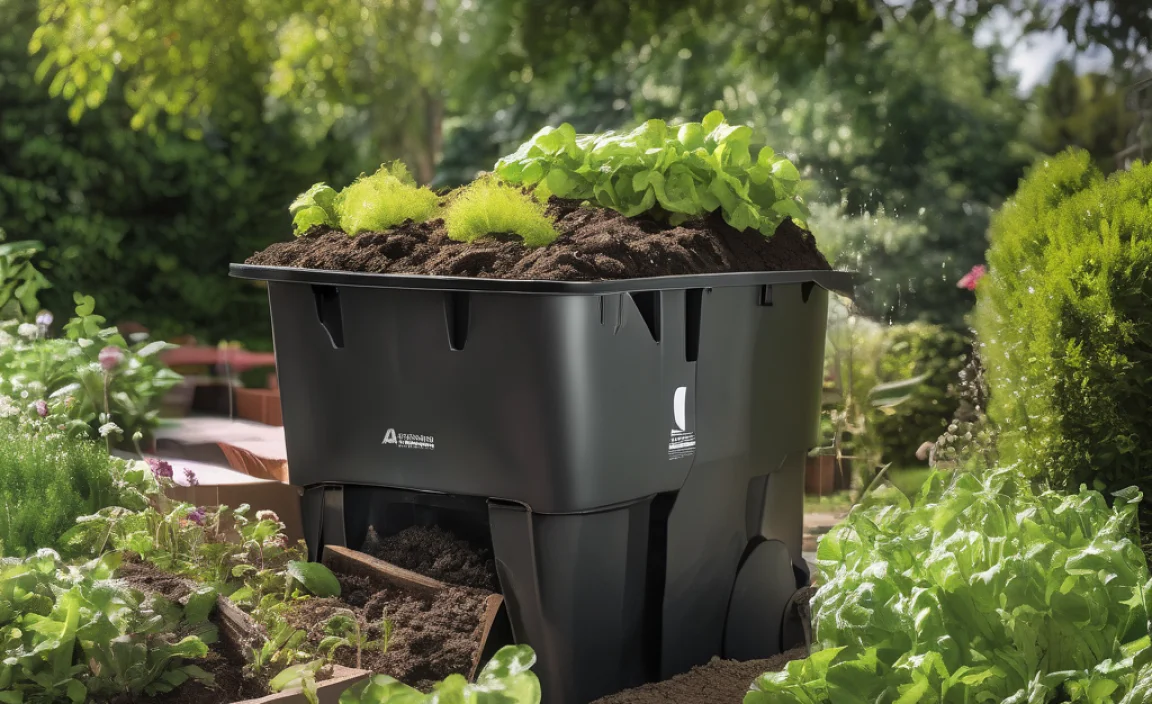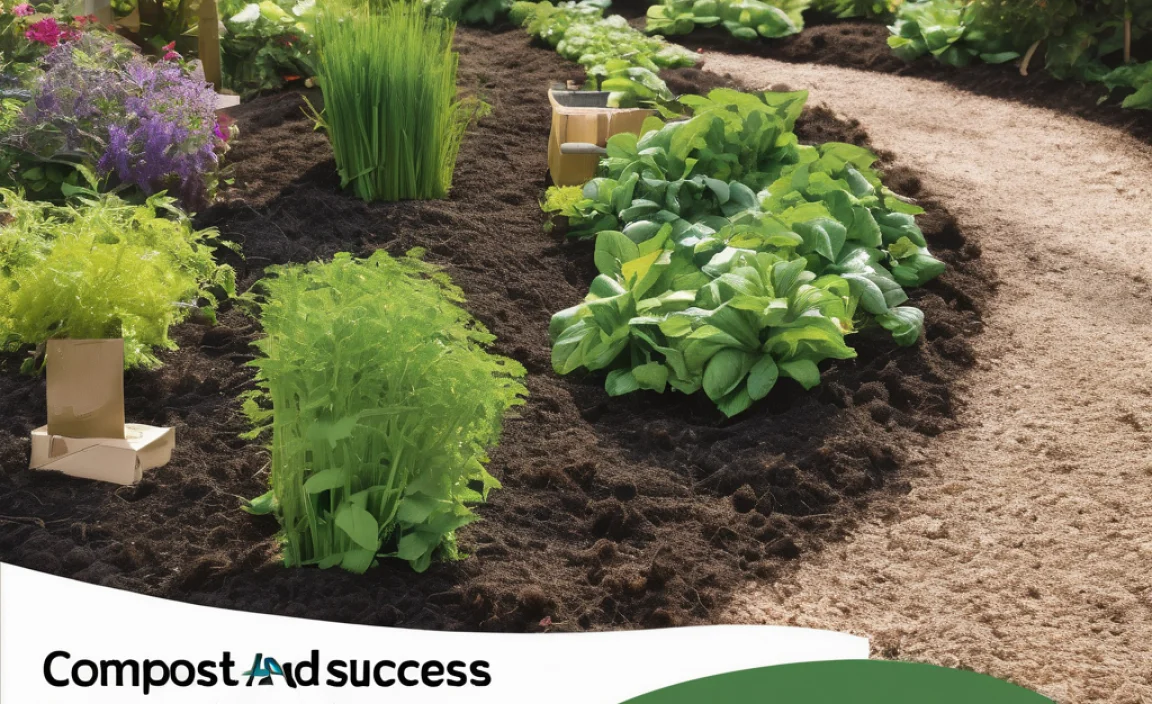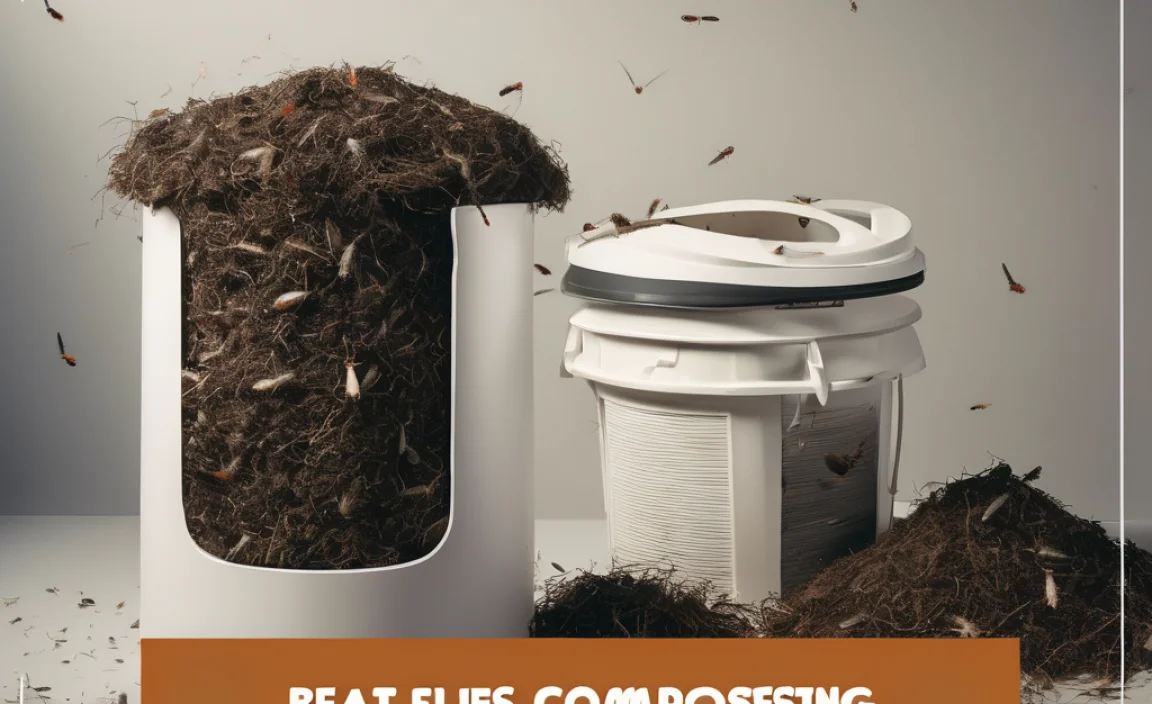Ever look at your kitchen scraps and garden waste and wonder if there’s a better way than the trash bin? You’re not alone! It can feel like a waste to toss those things. But what if I told you those “wastes” are actually gold for your garden? Get ready, because we’re about to unlock the amazing secrets of compost. We’ll show you exactly why making compost is one of the smartest things you can do for your garden and how easy it is to get started. Stick around to discover how you can transform your garden with this natural wonder!
Compost Benefits: Essential Garden Gains
Hey there, fellow home improvers and garden enthusiasts! Troy D Harn here, your go-to guy for making DIY and gardening projects less daunting and more doable. Today, we’re diving into something truly magical: compost. If you’ve ever wondered what all the fuss is about with “black gold” or felt a bit overwhelmed by the idea of composting, you’re in the right place. We’re going to break down exactly why composting is an absolute game-changer for your garden, making your plants happier, your soil healthier, and your gardening efforts more rewarding. Think of me as your friendly neighbor, showing you how to turn everyday stuff into a garden superpower. Let’s get digging into the fantastic benefits!
What Exactly is Compost?
Before we talk about the awesome benefits, let’s quickly define what compost is. Simply put, compost is decomposed organic material. It’s nature’s way of recycling, where things like kitchen scraps, yard trimmings, and other organic matter break down over time, transforming into a nutrient-rich soil amendment. It’s not just dirt; it’s a living, breathing system teeming with beneficial microbes that are fantastic for plant growth.
The Big Why: Unpacking the Incredible Compost Benefits
So, why should you bother with compost? Beyond just being a good way to recycle, compost offers a treasure trove of advantages for your garden. These aren’t small perks; they’re essential gains that can transform your patch of green from “okay” to “outstanding.” Let’s explore the top reasons to embrace composting:
1. Supercharges Soil Health and Structure
Compost is like a multi-vitamin for your soil. When you add compost, you’re not just adding nutrients; you’re improving the very structure of your soil. For sandy soils, which tend to drain too quickly and lose nutrients, compost acts like a sponge, helping to retain moisture and valuable minerals. For clay soils, which can become compacted and waterlogged, compost loosens them up, improving drainage and aeration. This means plant roots can breathe and grow more easily.
Think of it this way: Healthy soil is the foundation of a healthy garden. Compost builds that foundation by:
- Improving Soil Structure: It creates a crumbly texture that is easy for roots to penetrate.
- Enhancing Water Retention: Compost acts like a natural sponge, holding moisture where plants need it, reducing the need for frequent watering.
- Boosting Aeration: It allows air to penetrate the soil, which is crucial for root respiration.
2. A Nutrient Powerhouse for Plants
One of the most celebrated compost benefits is its rich nutrient content. Compost slowly releases essential nutrients that plants need to thrive. Unlike synthetic fertilizers, which can sometimes provide a quick burst of a few nutrients and then wash away, compost offers a broad spectrum of macro and micronutrients in a slow-release form. This provides sustained nourishment for your plants throughout the growing season.
Key nutrients found in compost include:
- Nitrogen (N)
- Phosphorus (P)
- Potassium (K)
- Calcium (Ca)
- Magnesium (Mg)
- Sulfur (S)
- Trace minerals like iron, manganese, zinc, and copper
This balanced supply of nutrients helps plants grow stronger, produce more flowers and fruits, and resist diseases.
3. Encouraging Beneficial Microorganisms and Earthworms
Compost is a living ecosystem in itself, filled with billions of beneficial bacteria, fungi, and other microorganisms. When you add compost to your soil, you’re essentially inoculating it with these helpful microscopic workers. These organisms play a vital role in breaking down organic matter, making nutrients available to plants, and even suppressing certain soil-borne diseases. Earthworms also love compost, and their burrowing further improves soil structure and aeration.
Why are these tiny helpers so important? They:
- Break down organic matter: Making nutrients accessible to plant roots.
- Suppress diseases: Competing with and inhibiting harmful pathogens.
- Improve nutrient cycling: Ensuring plants get what they need when they need it.
- Enhance soil aggregation: Helping to create those desirable soil crumbs.
4. A Natural Pest and Disease Fighter
Healthy plants are much more resistant to pests and diseases, and compost is a key ingredient in building that resilience. The beneficial microbes in compost can help to suppress the growth of plant pathogens. Additionally, by improving soil health, compost ensures plants are well-nourished. Strong, healthy plants are naturally better equipped to ward off pests and recover from any stresses they encounter.
Compost can help combat pests and diseases by:
- Increasing plant vigor: Healthy plants are less susceptible.
- Introducing beneficial microbes: Which outcompete pathogens.
- Improving soil drainage: Reducing conditions favorable to root rot.
5. Reduces the Need for Chemical Fertilizers and Pesticides
This is a big one for both your wallet and the environment. By using compost, you’re providing a natural, slow-release feeding system for your garden. This significantly reduces or even eliminates the need for synthetic fertilizers, which can be expensive and have negative environmental impacts, such as water pollution. Similarly, by promoting plant health and introducing beneficial organisms, compost can reduce your reliance on chemical pesticides. It’s a win-win for your garden and the planet!
6. Helps Soil Retain Moisture, Reducing Watering Needs
As mentioned earlier, compost acts like a super sponge. Its organic matter has a remarkable capacity to absorb and hold water. This means your soil will stay moist for longer periods, which is a huge advantage, especially during dry spells or if you live in a region with water restrictions. Less frequent watering not only saves you time and effort but also conserves a precious resource.
The water-holding capacity of compost is substantial. Adding it to your soil can:
- Decrease evaporation: Less water is lost from the soil surface.
- Reduce runoff: Water is absorbed rather than flowing away.
- Provide a reserve of moisture: For plants during dry periods.
7. Waste Reduction and Environmental Benefits
Composting is a fantastic way to divert organic waste from landfills. When food scraps and yard trimmings end up in landfills, they decompose anaerobically (without oxygen), producing methane, a potent greenhouse gas contributing to climate change. By composting these materials at home, you’re actively reducing landfill waste and mitigating greenhouse gas emissions. It’s a simple, yet powerful, environmental action you can take right in your backyard.
Composting significantly contributes to environmental health by:
- Diverting waste from landfills.
- Reducing methane emissions.
- Creating a valuable soil amendment, reducing the need for manufactured products.
- Improving local soil health and biodiversity.
8. pH Balancing Properties
Most compost has a near-neutral pH, typically between 6.0 and 7.0, which is ideal for the majority of garden plants. When added to the soil, compost can help moderate extreme pH levels. If your soil is too acidic or too alkaline, compost can help bring it closer to a balanced range, making nutrients more available to your plants.
9. Improved Plant Yield and Quality
When plants have access to healthy soil, consistent moisture, and a steady supply of nutrients, they thrive. This translates directly into more abundant harvests of fruits and vegetables, and more vibrant blooms from your flowers. The improved health and vigor of plants grown in compost-amended soil often mean better quality produce as well – tastier, more nutritious, and visually appealing.
Compost: Your Garden’s Secret Weapon
Let’s visualize what’s happening. Imagine your garden soil as a busy city. Healthy soil, enriched with compost, is a thriving metropolis with well-paved roads (good structure), ample resources (nutrients and water), and a vibrant community of helpful residents (beneficial microbes). Un-amended soil might be like a city with crumbling roads, scarce resources, and few friendly faces.
Here’s a quick look at how compost stacks up:
| Feature | Benefit of Compost | Impact on Garden |
|---|---|---|
| Soil Texture | Adds organic matter, improves aeration and drainage. | Easier root penetration, less waterlogging, better soil crumb. |
| Nutrients | Slow-release supply of macro and micronutrients. | Sustained plant growth, stronger plants, fewer deficiencies. |
| Water Retention | Acts like a sponge, holding moisture. | Reduces watering frequency, conserves water, fewer wilting plants. |
| Beneficial Life | Supports microbes, fungi, and earthworms. | Enhanced nutrient cycling, disease suppression, improved soil structure. |
| Pest & Disease Resistance | Boosts plant vigor and introduces beneficial organisms. | Healthier plants, fewer pest outbreaks, reduced need for chemicals. |
Getting Started with Composting: It’s Easier Than You Think!
Now that you’re convinced about the amazing compost benefits, you might be thinking, “How do I actually make this stuff?” Good news! Composting isn’t some ancient mystic art; it’s a practical process. You basically need a bin (or a pile), the right balance of materials, and a little patience.
For beginners, a simple compost bin is a great starting point. You can buy one or even make one yourself from recycled materials. The key to successful composting is the “greens” and “browns” ratio:
- Greens (Nitrogen-rich): Fruit and vegetable scraps, coffee grounds, tea bags, grass clippings, fresh plant trimmings.
- Browns (Carbon-rich): Dry leaves, straw, shredded newspaper (non-glossy), cardboard, small twigs, sawdust (untreated wood).
Aim for a ratio of roughly 2-3 parts browns to 1 part greens. This balanced diet for your compost pile ensures it breaks down efficiently without getting smelly or slimy.
For more detailed guidance on setting up your compost bin and what to put in it, check out resources like the EPA’s composting guide. They have excellent, straightforward information.
The Payoff: Your Garden Will Thank You
Imagine reaching for your trowel and sinking it into soil that feels rich, crumbly, and alive. Picture your tomato plants bursting with fruit, your roses blooming with abandon, and your salad greens growing crisp and plentiful. This is the reality that compost helps create. The essential garden gains are undeniable. You’ll see healthier plants, stronger growth, and a more vibrant, productive garden overall.
The investment in creating compost is minimal, especially when you consider the incredible return. It’s a sustainable practice that benefits your immediate surroundings and the wider environment. It’s empowering to know you can be a part of a natural cycle, turning what might otherwise be discarded into something incredibly valuable.
Conclusion: Start Composting Today for a Better Garden Tomorrow
So there you have it! The case for composting is clear and compelling. From enriching your soil and nourishing your plants with vital nutrients to reducing waste and helping the environment, the compost benefits are truly essential garden gains. It’s a practice that’s good for your plants, good for your wallet, and good for the planet. Don’t let the idea of it intimidate you. Start small, learn as you go, and begin reaping the rewards. Your garden, and your future self, will be incredibly grateful you did. Happy composting!
Frequently Asked Questions About Compost Benefits
Q1: How long does it take to make usable compost?
A1: It can vary! Depending on your composting method, the materials you use, and how actively you manage it (like turning), compost can be ready in anywhere from 2-3 months to a year. A well-managed hot compost pile will be faster than a passive cold pile.
Q2: What should I NOT put in my compost bin?
A2: It’s best to avoid meat, dairy products, oily foods, pet waste (from cats and dogs), diseased plants, and weeds that have gone to seed. These can attract pests, spread pathogens, or make your compost unusable.
Q3: Will my compost pile smell bad?
A3: A well-balanced compost pile should smell earthy, not rotten. If it smells bad (like ammonia or rotten eggs), it’s usually a sign that the ratio of greens to browns is off, or it’s too wet and not getting enough air. Try adding more browns and turning it.
Q4: Can I compost if I live in an apartment or have a small yard?
A4: Absolutely! You can use small, enclosed compost bins designed for balconies or indoor use, like worm composting (vermicomposting) systems. These are compact and efficient for smaller spaces.
Q5: How do I know when my compost is ready to use?
A5: Finished compost will be dark brown or black, crumbly, and have an earthy smell. You shouldn’t be able to identify the original materials you put in. It will look and feel like rich soil amendment.
Q6: Can compost really replace all my fertilizers?
A6: For many home gardeners, yes! Compost provides a broad spectrum of nutrients and improves soil so well that the need for supplemental fertilizers is greatly reduced or eliminated. For certain demanding plants or specific nutrient deficiencies, a little organic boost might still be beneficial, but compost is the fantastic foundation.

I am passionate about home engineering. I specialize in designing, installing, and maintaining heating, ventilation, and air conditioning systems. My goal is to help people stay comfortable in their homes all year long.



